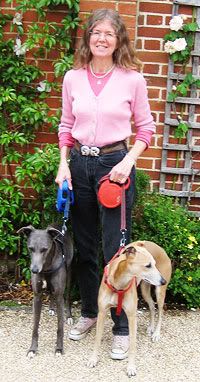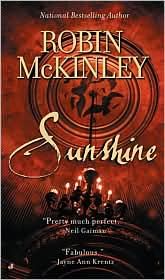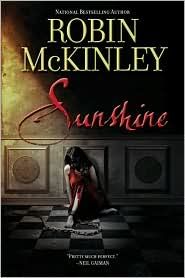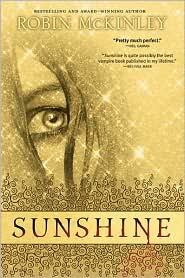Guest Blog: Robin McKinley

I can’t give you my Big Idea about SUNSHINE, because that’s not how it works with me. I can sometimes say one or two things in hindsight about a story after I’ve written it, but getting it written in the first place is the story’s idea, not mine. I do what it tells me, or it keeps me awake at night and smacks me in the face with more than the usual number of whippy, thorn-studded rose stems when I’m out in the garden as a break from writing it, and it loses my place in the books I’m reading which I fondly imagine are research to write it better. Occasionally it makes me forget to buy chocolate before I run out. That really hurts. And I’m sure my books have never had any Big Ideas about me. I see them all sitting around a big stone fireplace in an old-fashioned pub like The Prancing Pony or my Hampshire local, the Dragon and Honeybee, with a very large pitcher of the Dragon’s home-brewed beer, taking turns to one-up each other in horror stories of my incompetence, and scaring the wits out of the books I haven’t written yet.
“She thought I was a short story,” says BEAUTY: but at least half of them will start laughing uncontrollably at this remark and require to be thumped on the back by the other half.
“She never did get my king’s name right,” says THE BLUE SWORD. “I mean, really.”
“That’s nothing,” says THE HERO AND THE CROWN: “she missed the entire last section of me. She thought I ended after the battle in front of the City. Fancy forgetting about Maur’s head!”
There’s a general murmur of sympathy and then AERIN says worriedly, “She doesn’t think I go back to Luthe and it’s all happily ever after, does she?”
“No, no,” says ONE OF THE FOUR THIRD DAMARIAN NOVELS. “Even she’s not that thick!”
PEGASUS II stirs uncomfortably. “Well . . .”
SPINDLE’S END reaches out and pats PEG II’s arm. “It’s always worse when you’re the one in the hot seat. It’ll be okay. She’s not a bad old thing really.”

. . . So. Anyway [says the not a bad old thing really]. I seriously don’t know what I’m getting into when I start to write a story. I don’t think I’ve ever got a main character wrong--and I knew going in, for example, that THE OUTLAWS OF SHERWOOD would be told from more than just Robin’s point of view--and I’ve never (yet) got the central romance wrong, although I’ve several times been surprised by who some of the other characters go off with.
The important thing, when I start to write something down, is that I know it’s a story. How I know it’s a story I described in the afterword to ROSE DAUGHTER: ‘The thing that tells me when one of the pictures in my head or phrases in my ear is a story, and not a mere afternoon’s distraction, is its life, its strength, its vitality. If you were picking up stones in the dark, you would know when you picked up a puppy instead. It’s warm; it wriggles; it’s alive.”
Sometimes that’s nearly all I know: that it’s alive. My other standard explanation for my cluelessness about what I’m given to write is that the Story Council sends my stories to me. And how do you know what’s in a parcel till you open it? I had a conversation with a deliveryman about a fortnight ago. He had brought me a big heavy package that rustled. I was briefly nonplussed by the gentle rattling and he said, I bet it’s dog food. This was a reasonable guess, since my brace of hellhounds was hanging over the bottom half of the stable-style front door and wagging their tails at him. Of course, I said. That’s what it is.
It wasn’t. It was (noisy) plant food. Now, I’d ordered both plant food and dog food recently . . . and even so, when presented with a box that jiggles and whispers, I still couldn’t guess what’s in it. It’s not surprising that when I take a delivery from the Story Council I stand there with it in my mind’s hands, looking at it with my mind’s eye and going ‘eeep’.

SUNSHINE (with reference to the undue hilarity in response to BEAUTY’s remark above) is one of several of my novels that started life as short stories. Or rather, that I started writing believing them to be short stories. In SUNSHINE’s case the revolution was pretty straightforward. I got to the end of what had mysteriously, some time during the course of its first 30,000 words, stopped being the end of a short story and become the end of part one-and had to turn the page and start part two: It might not have been too bad, afterward, except for two things. The nightmares. And the fact that the cut on my breast wouldn’t heal.
I’ve always loved vampires. Of all the things that go bump in the night, vampires are my favourite. Werewolves are fine and there are a lot of classy demons--but give me a vampire. I can’t remember the first time I read Bram Stoker’s DRACULA--I was too young to recognise how silly it is, at any rate, and I found all the human standing around and swearing loyalty to each other before going into battle with the undead moving rather than Victorian. I still love DRACULA and indeed I love the Victorianness of it--the buttoned-upness. I don’t like graphic horror, and am merely grossed out by it, not thrilled or titillated or even, really, frightened, just totally yuckified. The combination of horror with primness works for me--the contrast gives the horror room to work.
Also, I am a wuss. There was a long stretch there--call it twenty years--where vampires and all the other standard monsters were pretty well taken over by the graphic gang. Some of those books were good too--I even read a few, with one eye closed, my hand over my mouth, and my other hand turning pages faster than is usual with me. But I didn’t enjoy them. I don’t enjoy graphic. (I never saw any of the serious-blood-loss films. My peak cinematic Dracula experience was the 1977 Louis Jordan film.) And as the years passed, and there didn’t seem to be any of my sort of vampires any more, I grew wistful. One of the things, for me anyway, that is lost when uninhibited violence takes over is the sexiness. Vampires have always been about sex and lust, especially prohibited sex and lust--they certainly were for Stoker. (So deliciously Victorian to have it about biting someone’s neck.) I wanted that thrill of sexual attraction to something that might kill you back.
And then two important things happened: Buffy. And Anita Blake.

Even Buffy is a little too explicit for me sometimes--and I love it that Buffy’s staked vampires go instantly to ash--and Anita Blake is way over my line. I picked up my first Anita Blake off a friend’s bookshelf and she said immediately, put that down. You won’t like it. It’s much too gruesome for you. She was right. It is. I read them anyway. I love Anita and Buffy for being offhand, wisecracking, one might almost say to-die-for funny--and powerful, sexually aware female voices, chatting to you matter-of-factly about dealing with vampires and werewolves, zombies and necromancers. And being hit on by some local big vampire guy. Cool.
Meanwhile, back in the semi-real world I needed a FIRE story. Peter (my husband the English writer Peter Dickinson) and I are theoretically doing a series of short-story anthologies on elemental spirits. The first one, WATER, came out something like a decade ago. Theoretically FIRE should have appeared shortly after. (It finally came out last autumn. My novels SUNSHINE, DRAGONHAVEN and CHALICE all started life as FIRE stories.) And so--nearly a decade ago--I was thinking about stuff where fire was important--prodding anything banked and smoldering for story-embers. And there was this odd little flare about the well-known fact that vampires fry if they’re caught in sunlight. Hmmmm. . . .
I can remember the moment when I realised that SUNSHINE was a story--that I’d picked up a puppy instead of a stone. I was standing on the drive at the old house and looking out at the sunlit lawn, and thinking about incendiary vampires. And I heard Sunshine’s own voice talking to me for the first time. This isn’t precisely what she said, that first time--it’s never that easy, unfortunately--but this is how what she was telling me appeared in the book I spent the next year possessed by: It’s not that any of the Others are really popular, or that it had only been the vampires against us during the Wars. But a big point about vampires is that they are the only ones that can’t hide what they are: let a little sunlight touch them and they burst into flames. Very final flames. . . . if anyone ever manages to distill a drug that lets a vampire go out in daylight they’ll be worth more money in a month than the present total of all bank balances held by everyone on the global council. There are a lot of scientists and backyard bozos out there trying for that jackpot--on both sides of the line. The smart money is on the black-market guys. . . .
And I had to go start writing it down.
Robin McKinley is an American writer living in Hampshire, England with her husband, the English writer Peter Dickinson, two hellhounds, far too many rosebushes, and an 1897 Steinway upright. You can read way too much about her and her books on her website, www.robinmckinley.com/ and her blog www.robinmckinleysblog.com/ Her novel PEGASUS will be out from Putnams in November ’10.